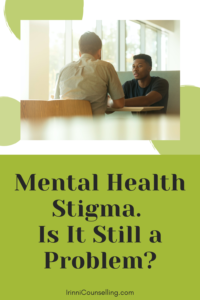
Mental Health Stigma. Is It Still a Problem?
We all have health. Mental health and physical health. So why has mental health stigma been a thing, and has the tide finally turned?
Misconceptions and science
One of the problems has been that physical health is often very visible and science figured out what was going on much quicker. It’s far easier to witness how bones repair after a break than it is to find out exactly what’s going on inside the brain.
This led to good knowledge of physical health problems and how to fix them, but left a gap in mental health problems, creating some fear and misconceptions of and about those who were ill, and led to mental health stigma.
Even as the fields of psychology and psychiatry grew, the focus was firmly on what was wrong, and it was only when positive psychology was studied in the 1990s that we developed a deeper understanding of well-being in terms of mental health.
Mental illness isn’t a life sentence
Gone are the days of being put into some sort of institution, disowned by your community, and forgotten about. Nowadays, people are leading active lives and working jobs with mental illness.
With a better understanding of mental health, positive psychology, and effective treatments and practices, it’s far easier to live in society with a mental health condition than it used to be.
Mental health first aid training means workplaces are becoming more accepting of mental health challenges and more compassionate, so the stigma begins to reduce.
Using platforms to speak up
So many people now openly share about their mental health challenges through blogs, podcasts, videos, books, and social media, because they are no longer willing to accept mental health stigma.
This helps people realise that they are not alone and starts to normalise mental health challenges in all forms, from a short stint of psychosis in pregnancy or PTSD following a traumatic event to a lifetime of anxiety or eating disorders.
Mental health challenges come in all shapes and sizes, just like those who experience them.
Positive mental health messages
Speaking of social media, there are now endless accounts sharing uplifting content, words of wisdom, and positive messages around trauma, mental health, and wellbeing.
Here are some positive pages you might want to follow:
Royals are opening up about mental health
It’s not just everyday people speaking up about mental health, even Royals are addressing the fact that we all have mental health and it’s a fragile thing that we must look after.
Prince William and Kate Middleton set up the Heads Together initiative to help tackle the stigma and open up conversations about mental health.
Seek help, even if you can’t speak up
If you’re not ready to speak up in public about your mental health challenges that’s fine, but it’s still important to seek help and get support.
Sharing privately in counselling sessions can help take the weight off your shoulders and release any feelings of stigma or shame.
I’m here to offer psychotherapeutic counselling in Suffolk or remotely whenever you are ready. Simply contact me and we can discuss how best to move forwards.
